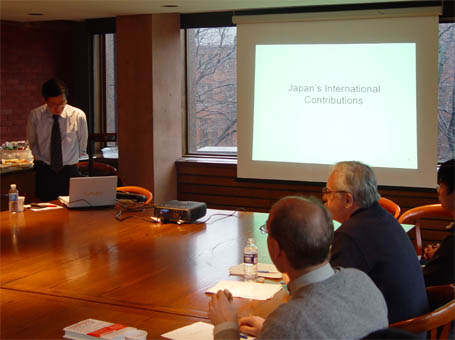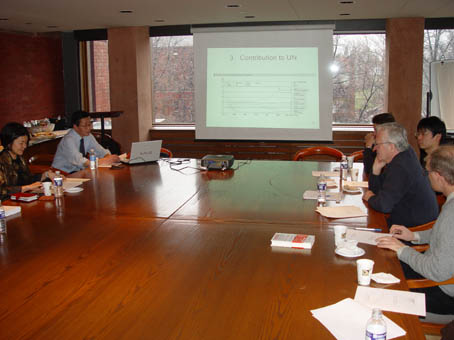
Consul General Kawakami Gives Lecture at the University of Toronto on Japan's International Contributions
Consul General of Japan in Toronto Koichi Kawakami outlined Japan's contributions to international peace and prosperity, speaking at the University of Toronto's Munk Centre for International Studies on December 1.
Consul General Kawakami explained to the audience of students and faculty that Japan makes international contributions such as Official Development Assistance, contributions for peace and contributions to the United Nations because, "Japan must rely on foreign sources for approximately 80 per cent of its energy supply. As well, its food self-sufficiency on a calorie supply basis is 40 per cent. So it is evident that Japan needs a peaceful and prosperous international environment in order to maintain its own peace and prosperity."
The Consul General outlined the prominent amount of ODA disbursed by Japan. "Among the nations in the world, Japan contributed the most amount of ODA each year between 1991 and 2000. In the 10 years between 1994 and 2003, Japan’s assistance was $111 billion and still No. 1," he said. "Of the $560 billion in total, Japan had contributed 20 per cent. Particular importance was placed on countries in Asia, which accounted for 42.7 per cent of bilateral ODA disbursement of Japan in 2004."
He also described the advantages that result when sound infrastructure is established in a developing country through yen loans, bringing about foreign direct investment. "The cases of Thailand and Malaysia are actually typical in East Asia, where economic growth was also facilitated by attracting foreign direct investment from the Japanese private sector. And the good infrastructure of these two countries, realized by yen loans, was one of the decisive elements for Japanese companies when they chose the host countries of their direct investment," he said.
"However, the world cannot count on prolonged prosperity as long as regional conflicts undermine efforts such as ODA," the Consul General said before going on to describe Japan's contributions toward peace and the role of the country's Self Defense Forces (SDF).
Mr. Kawakami pointed out that since Japan joined the United Nations in 1956, it has proactively promoted peace and prosperity in various fields. Moreover, "In 1992, Japan enacted the International Peace Cooperation Law, which enabled the dispatch of the country’s Self Defense Forces for PKO and international humanitarian relief activities." He explained that Japan has participated in no less than eight UN Peacekeeping Operations since then.
He outlined the various activities Japan has undertaken in countries such as Afghanistan and Iraq. In Afghanistan, Japan has supported elections, sought improvements in local security through Disarmament, Demobilization and Reintegration of Ex-Combatants (DDR) and de-mining activities, and assisted in reconstruction, with total Japanese assistance to Afghanistan amounting to approximately $1 billion U.S.between September 2001 and November 2005. In Iraq, Japan dispatched the Ground SDF to the country in order to conduct such humanitarian and reconstruction assistance activities as medical care and water supplies, as well as the restoration and reconstruction of schools and other public facilities. "The dangerous operation of airlifting by the Air SDF continues," he said, explaining, "The activities include air operations between Kuwait and Iraq, transporting various humanitarian support materials on the C-130 transport plane of the Air SDF."

The Consul General concluded by outlining Japan's contribution to the UN. "In financial terms, Japan contributes 19.5 per cent of the UN regular budget, and is the second largest contributor only to the United States, which contributes 22 per cent," he said. "The changing world situation is placing greater expectations on the reform of the UN and the Security Council in particular." The United Nations began with only 51 members, in contrast to the 192 it has now. The Security Council consisted of eleven members at the start, and the only change of its structure was an addition in 1965 of four non-permanent member seats. Although it has filled non-permanent member seats many times in the past, Japan is currently seeking permanent membership on the Security Council.
He concluded by stating that, "Japan’s postwar role has changed significantly to become one of the top donors and active participant in peace building. Japan has welcomed its new responsibilities and will continue to do so in the future."

